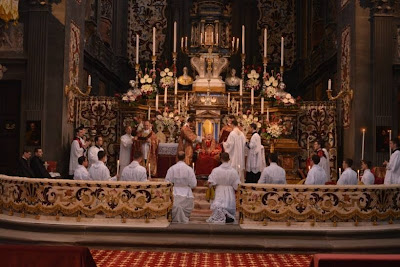Tomorrow is the 13th Friday before the
Feast of St. Francis of Paola this year and thus the first day of the Thirteen Fridays in Honor of St. Francis of Paola. This is an indulged devotion with the following excerpted from the
Raccolta:
Pope Clement XII., in the Brief Coelestium munerum dispensatio of Dec. 2, 1738, granted -
i. A plenary indulgence to all the faithful who, upon thirteen Fridays continuously preceding the
Feast of St. Francis of Paola (April 2), or at any other time of the year, shall, in honour of this Saint, being truly penitent, visit, after Confession and Communion, a church of the Minims, commonly called the Paolotti, either already erected or hereafter to be erected, and pray there for our Holy Mother Church; this Indulgence may be gained on any one of the said Fridays; and
ii. An indulgence of seven years and seven quarantines on all other Fridays.
Moreover, wherever there are not churches of the above named order, or where they are distant at least a mile from a person’s own dwelling, the same Clement XII. granted in these two cases, by a Brief Nuper editae of March 20, 1739, the same indulgences to the faithful as are mentioned above, conditional of course upon their previous Confession and Communion. In this Brief permission is given to visit any other church whatsoever dedicated to God in honour of St. Francis of Paola, or any altar existing in any church where there is a picture of this glorious Saint; and if none of these conditions can be complied with, the visit may be made to their own parish church.
This devotion originated with St. Francis himself, who practised it in honour of our Lord Jesus Christ and His twelve Apostles with this intent, on each of the thirteen Fridays he used to recite thirteen Pater noster’s and as many Ave Maria’s, and this devotion he promulgated by word of mouth and by letter to his own devout followers, as an efficacious means of obtaining from God the graces they desired, provided they were for the greater good of their souls.
Since the death of the Saint, which took place April 2, 1507, the day on which Good Friday fell in that year, this devotion has always been practised by the faithful throughout the whole Catholic world in honour of the holy Founder; and so it came at last to be approved by the said Clement XII., who granted the Indulgences above named, in order to animate good Christians to adopt it.


.jpg)














